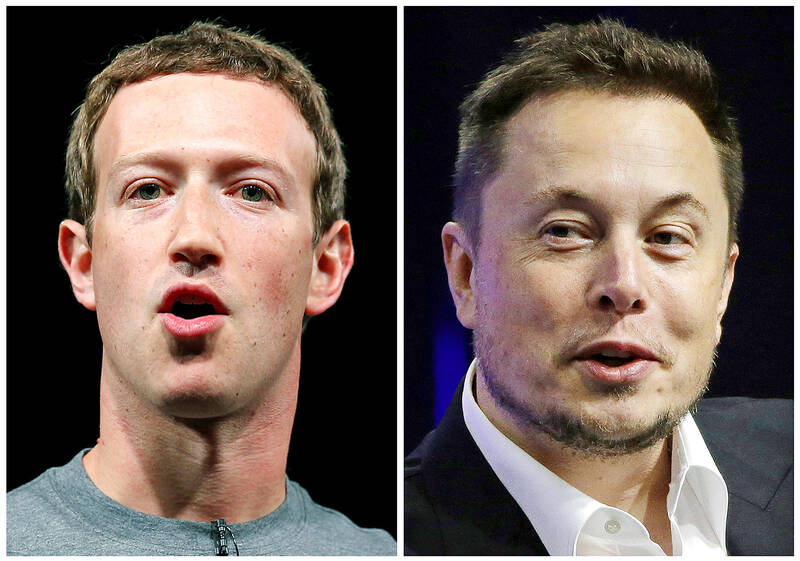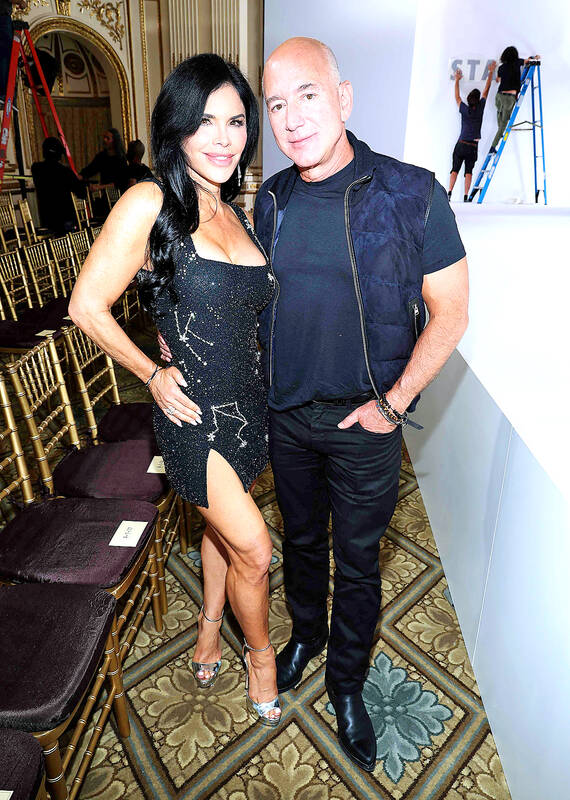The first rule of insecure masculinity fight club? Tell everyone about it. And I mean everyone. Tweet about it, talk to reporters, shout about it from the rooftops. Make sure the entire world knows that you are a big boy who could beat just about anyone in a fistfight.
Twenty twenty-three, as I’m sure you will have observed, was the year that tech CEOs stepped away from their screens and decided to get physical. Elon Musk, perennially thirsty for attention, was at the center of this embarrassing development. The 52-year-old — who challenged Vladimir Putin to single combat last year — spent much of the year teasing the idea that he was going head-to-head with Mark Zuckerberg in a cage fight. At one point he suggested the fight would be held at the Colosseum in Rome.
Don’t worry, you didn’t miss it. The fight never happened and will never ever happen for the simple reason that Musk would get destroyed by Zuckerberg, who has been obsessively training in mixed martial arts (MMA) and won a bunch of medals in a Brazilian jiujitsu tournament. The only way Musk will actually follow through with the cage match is if he manages to get his hands on some kind of brain-implant technology that magically transforms him into a lean, mean, fighting machine. Indeed, I wouldn’t be surprised if Neuralink, Musk’s brain-chip startup, was working on that brief right now. Although seeing as the company is under federal investigation after killing 1,500 animals in testing — many of which died extremely grisly deaths — it may be a while before any such technology comes to fruition.

Photo: AP
Musk and Zuck aren’t the only tech execs looking to get physical. Vin Diesel-level biceps have become the latest billionaire status symbol. Just look at Jeff Bezos: his muscles have increased at about the same rate as his bank account. The Airbnb CEO, Brian Chesky, has also been working on getting swole. Back in June, Chesky told the Bloomberg writer Dave Lee that he’d “challenge any leader in tech to bench press.” He added: “I’ve been waiting for these physical battles in tech. It’s just so funny.”
It’s not just tech bros. Politicians are at it too. Over the summer, Robert F Kennedy Jr posted a video of himself doing push-ups while shirtless with the caption “Getting in shape for my debates with President Biden!” Which may or may not have been prompted by Biden once challenging an Iowa voter and Donald Trump to a push-up contest.
I don’t know how good Kevin McCarthy is at push-ups, but he’s certainly fond of shoving. In November, the former speaker bumped into the congressman Tim Burchett of Tennessee and reportedly elbowed him in the back. Burchett then chased after him, calling him a “jerk” and a “chicken.” McCarthy, it seems, was angry that Burchett had helped oust him from the speakership in October, making him the first speaker in US history to have been removed by his own side.

Photo: AFP
Just a few hours after that altercation, Markwayne Mullin, a Republican senator from Oklahoma, challenged Sean O’Brien, president of the International Brotherhood of Teamsters, to a physical confrontation during a Senate committee hearing on labor unions. Mullin, a former businessman who regularly boasts about his prowess as an MMA fighter, was miffed that O’Brien had once called him a “greedy CEO” and a “clown” on Twitter. He decided to settle his private grievance during a public hearing and the two agreed to have a fight right there and then — yelling at each other to “stand your butt up” and get started. Eventually Bernie Sanders got them to calm down.
Just pause for a moment and imagine acting like this in your own job. I don’t know about you, but I’m pretty sure that if I challenged a colleague to a fight and started yelling at them to “sit their butt down” in the middle of a public meeting, I would face some sort of consequences. In the Mullins case, the meltdown doesn’t seem to have had any impact on his career. It may have even increased his popularity among his base. Politicians routinely seem to be held to a lower standard than the rest of us.
If you ignore the fact that we’re being ruled by people with enormous egos and no self-restraint, then there is an amusing element to all this. But more than anything, it’s just pathetic, isn’t it? All these grown men so clearly worried about their masculinity that they feel the need to puff out their chests and show everyone just how strong they are.
The one per cent’s desperate shows of bravado are part of a broader insecurity about masculinity in the west that plenty of snake-oil salesmen and opportunists are exploiting for all it’s worth. For example, last year the rightwing commentator Tucker Carlson came out with a documentary called The End of Men that argues testosterone counts are plummeting and “real men” are an endangered species. The documentary was full of bizarre ways to counteract this, including testicle tanning. I’m not sure how many tech bros and politicians are regularly exposing their balls to red-light therapy, but there does seem to be a widespread preoccupation with “bromeopathic” ways to increase testosterone. Testosterone blood-test “T parties” are apparently a growing trend among tech types: a bunch of founders get together and find ways to raise their T.
Do whatever you like in private, I say. Tan your testicles, go to T parties, organize push-up competitions. Just don’t foist your masculine insecurities on the rest of us. Stop challenging each other to public fights and getting into brawls in government. It seems to be easy enough for women to follow this advice, doesn’t it? I mean … has a female CEO or politician ever tried to organize a public fistfight with a female counterpart? I’ve got a weird feeling the answer is “no, they would be a complete laughingstock if they did,” but if anyone can find me a recent example then I’ll eat my hat. Or — on second thoughts — I’ll throw my hat in the ring and fight Elon Musk myself in the Roman Colosseum. Consider that a challenge.

The Democratic Progressive Party (DPP), Chinese Nationalist Party (KMT), and the country’s other political groups dare not offend religious groups, says Chen Lih-ming (陳立民), founder of the Taiwan Anti-Religion Alliance (台灣反宗教者聯盟). “It’s the same in other democracies, of course, but because political struggles in Taiwan are extraordinarily fierce, you’ll see candidates visiting several temples each day ahead of elections. That adds impetus to religion here,” says the retired college lecturer. In Japan’s most recent election, the Liberal Democratic Party lost many votes because of its ties to the Unification Church (“the Moonies”). Chen contrasts the progress made by anti-religion movements in

Taiwan doesn’t have a lot of railways, but its network has plenty of history. The government-owned entity that last year became the Taiwan Railway Corp (TRC) has been operating trains since 1891. During the 1895-1945 period of Japanese rule, the colonial government made huge investments in rail infrastructure. The northern port city of Keelung was connected to Kaohsiung in the south. New lines appeared in Pingtung, Yilan and the Hualien-Taitung region. Railway enthusiasts exploring Taiwan will find plenty to amuse themselves. Taipei will soon gain its second rail-themed museum. Elsewhere there’s a number of endearing branch lines and rolling-stock collections, some

This was not supposed to be an election year. The local media is billing it as the “2025 great recall era” (2025大罷免時代) or the “2025 great recall wave” (2025大罷免潮), with many now just shortening it to “great recall.” As of this writing the number of campaigns that have submitted the requisite one percent of eligible voters signatures in legislative districts is 51 — 35 targeting Chinese Nationalist Party (KMT) caucus lawmakers and 16 targeting Democratic Progressive Party (DPP) lawmakers. The pan-green side has more as they started earlier. Many recall campaigns are billing themselves as “Winter Bluebirds” after the “Bluebird Action”

Last week the State Department made several small changes to its Web information on Taiwan. First, it removed a statement saying that the US “does not support Taiwan independence.” The current statement now reads: “We oppose any unilateral changes to the status quo from either side. We expect cross-strait differences to be resolved by peaceful means, free from coercion, in a manner acceptable to the people on both sides of the Strait.” In 2022 the administration of Joe Biden also removed that verbiage, but after a month of pressure from the People’s Republic of China (PRC), reinstated it. The American